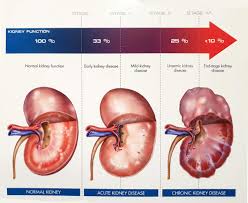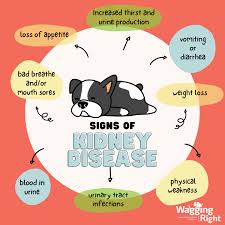Renal failure, also known as kidney failure, occurs when the kidneys lose their ability to function properly. The kidneys play a vital role in filtering waste products from the blood and maintaining the body’s fluid balance. When they fail to perform these functions adequately, it can lead to a buildup of toxins and imbalances in the body.
Types of Renal Failure:
There are two main types of renal failure in dogs: chronic and acute. Chronic renal failure develops gradually over time, often due to age-related changes or underlying health conditions. Acute renal failure, on the other hand, occurs suddenly and is typically caused by factors such as toxins, infections, or trauma.
Etiology:
Chronic renal failure in dogs can be caused by a variety of factors, including aging, genetics, and underlying health conditions such as kidney disease or hypertension. Other contributing factors may include prolonged use of certain medications or exposure to toxins in the environment.
Acute renal failure can result from sudden and severe injury to the kidneys, such as ingestion of toxic substances like antifreeze or certain medications, urinary tract obstructions, or severe dehydration. Infections, trauma, and underlying health conditions can also precipitate acute renal failure.
Pathogenesis:
To comprehend how renal failure occurs, it’s essential to understand the normal function of the kidneys. The kidneys filter waste products and excess fluids from the blood, which are then excreted as urine. They also help regulate blood pressure, produce hormones, and maintain electrolyte balance in the body.
How Renal Failure Occurs
Renal failure occurs when the kidneys are unable to perform these functions adequately. This can happen due to damage to the kidney tissues, decreased blood flow to the kidneys, or impaired filtration and excretion processes. Over time, the kidneys may become progressively damaged, leading to a decline in their function.

Clinical Signs:
Symptoms of Renal Failure
Early Signs
Early signs of renal failure in dogs may include increased thirst and urination, decreased appetite, weight loss, and lethargy. As the condition progresses, dogs may experience vomiting, diarrhea, weakness, and changes in behavior or posture.
Advanced Signs
In advanced stages of renal failure, dogs may develop severe dehydration, electrolyte imbalances, anemia, and neurological symptoms such as seizures or coma. Without prompt intervention, renal failure can be life-threatening.
- For daily videos visit our YouTube Channel
Diagnosis Methods:
Physical Examination
During a physical examination, veterinarians may palpate the abdomen for abnormalities, check for signs of dehydration or fluid retention, and assess the overall condition of the dog.
Laboratory Tests
Laboratory tests such as blood tests and urinalysis can provide valuable information about kidney function, electrolyte levels, and the presence of abnormalities such as protein or blood in the urine.
Imaging Studies
Imaging techniques such as ultrasound or radiography may be used to visualize the kidneys and detect any structural abnormalities or changes in size, shape, or texture.
Treatment:
Management Approaches
Medical Treatment
Medical treatment for renal failure in dogs may include medications to manage symptoms such as nausea, vomiting, or high blood pressure, as well as supplements to support kidney function and promote healing.
Dietary Management
Diet plays a crucial role in managing renal failure in dogs. Specialized prescription diets low in protein, phosphorus, and sodium can help reduce the workload on the kidneys and minimize further damage.
Fluid Therapy
Fluid therapy may be necessary to maintain hydration and electrolyte balance in dogs with renal failure. Intravenous fluids may be administered to correct dehydration and support kidney function.
Precautions:
Preventive Measures
Diet and Nutrition
Feeding a balanced diet that is appropriate for the dog’s age, breed, and health status can help prevent or delay the onset of renal failure. Avoiding excessive protein, phosphorus, and sodium intake can also help reduce the risk of kidney damage.
Regular Vet Checkups
Regular veterinary checkups are essential for monitoring the dog’s health and detecting any signs of renal disease early on. Routine blood tests and urinalysis can help identify changes in kidney function before they become severe.
- For More Details Click Here
Environmental Considerations
Avoid exposing dogs to potentially harmful substances such as toxins, chemicals, or medications that can damage the kidneys. Providing clean drinking water and a safe environment free from hazards can help protect the kidneys and overall health of the dog.
In conclusion, renal failure in dogs is a complex and potentially life-threatening condition that requires prompt diagnosis and treatment. By understanding the causes, symptoms, and treatment options for renal failure, pet owners can take proactive steps to support their dog’s kidney health and overall well-being.
FAQs:
-
Can renal failure in dogs be cured?
Renal failure is often irreversible, but early intervention and appropriate management can help slow the progression of the disease and improve the dog’s quality of life. -
Is renal failure more common in certain breeds?
Some breeds may be predisposed to developing renal failure due to genetic factors or breed-specific health conditions. These include breeds such as the Labrador Retriever, Golden Retriever, and Cocker Spaniel. -
Can diet alone reverse renal failure in dogs?
While a specialized renal diet can help manage the symptoms of renal failure and slow its progression, it cannot reverse the damage already done to the kidneys. However, dietary management is an essential component of treatment. -
Are there any alternative therapies for renal failure in dogs?
Some alternative therapies, such as acupuncture or herbal supplements, may be used as complementary treatments for renal failure in dogs. However, their efficacy and safety should be discussed with a veterinarian. -
What is the prognosis for dogs with renal failure?
The prognosis for dogs with renal failure depends on various factors, including the underlying cause, the severity of the disease, and the dog’s response to treatment. With appropriate care and management, many dogs with renal failure can enjoy a good quality of life for an extended period.


